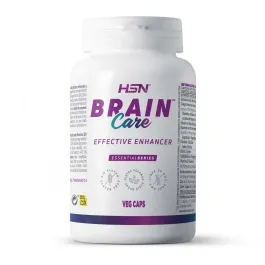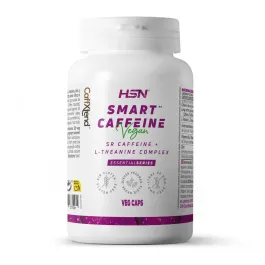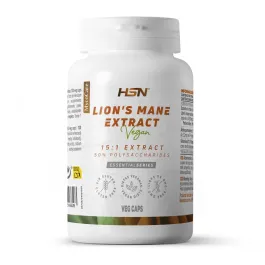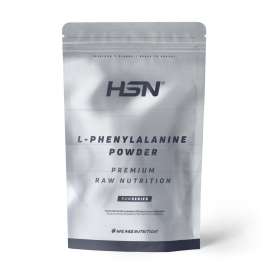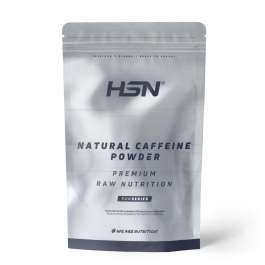
PEA & MAG (MICRONIZED PALMITOYLTANOLAMIDE + MAGNESIUM)
1200 mg of Micronized Palmitoylethanolamide. Maximum bioavailability. Maximum absorption and utilization. With Magnesium Citrate. PEA suitable for vegan diets.




- A micronized Palmitoylethanolamide dietary supplement! Maximum bioavailability guaranteed.
- Effective supply of 1200 mg per daily dose of micronized PEA. With Magnesium Citrate for synergistic activity.
- Obtained from plant-based sources: PEA suitable for vegetarian and vegan diets.
- The most effective way to provide Palmitoylethanolamide since its presence in foods is very limited.
Table of contents
PEA & Mag is not just another product - Try it, you won’t want to change
PEA & Mag (micronized Palmitoylethanolamide + Magnesium) from EssentialSeries is a dietary supplement in vegetable capsules made from the compound micronized Palmitoylethanolamide, plant-based, and Magnesium citrate as a highly bioavailable magnesium source to make the most of its properties.
PEA, or Palmitoylethanolamide, belongs to the fatty acid amides family. PEA naturally exists in the body, is synthesized as needed by the body, and is found in all body tissues.
Our PEA & Mag is a dietary supplement with the highest absorption and bioavailability available.
Made from the best PEA raw material. Here’s the scoop
Palmitoylethanolamide from plant-based sources - Suitable for vegan diets
Palmitoylethanolamide is a compound known to be characteristic of animal structures; in fact, it was first discovered in egg yolk. This means many PEAs on the market are not suitable for vegan diets, as they come from animal sources.
However, our micronized PEA is obtained from plant-based sources, which, although rarer and therefore more exclusive and costly to produce, do exist, and at HSN we care about them because they allow us to produce a dietary supplement suitable for everyone, with the best quality.
Our philosophy doesn’t agree with limiting options for our customers just because a more suitable source for everyone is more exclusive. Our R&D team works to find the best options for all users, and that’s why our palmitoylethanolamide is also suitable for vegan diets as it contains no animal-derived ingredients.
The challenge of getting PEA through diet | Supplementation as the only practical way
Regarding the common question... Can I get PEA through my regular diet?
The answer is yes, but with a huge but.
PEA is found in many food sources at levels ranging from 950 µg/g fresh weight in soy lecithin to 7.2 µg/g fresh weight in roasted coffee, 0.14 µg/g fresh weight in carilla beans, and less than 10 ng/g dry weight in apples, lentils, and potatoes. It’s also present in human milk, with levels between approximately 0.1 and 3 nM.
The but is that to put these numbers in perspective, PEA has been used in clinical trials at doses between 300 and 1200 mg per day, which would require daily consumption of 0.32–1.3 kg of soy lecithin, 42–170 kg of roasted coffee, and 2200–8700 kg of carilla beans.
Scientists suspect that the safety profile of such consumption, besides being completely impractical, would be less satisfactory than that observed with PEA formulations as dietary supplements.
That’s why the best way to consume palmitoylethanolamide is through dietary supplements like our PEA & Mag.
With a significant supply of Magnesium for synergistic activity
HSN’s formula is not only effective because of the PEA itself, but also due to a combined approach with an effective and synergistic formula thanks to the presence of magnesium, an important mineral with key effects for people who want to take better care of themselves.
Magnesium contributes to the normal functioning of the nervous system and to the maintenance of bones under normal conditions.
PEA’s relevance in recent scientific research - A rising compound
The first study on palmitoylethanolamide dates back to 1957, the year the compound was discovered and named, first identified in egg yolk, soybeans, and peanut oil, and later in 1965 found in mammal tissues.
In recent decades, the number of scientific studies published on PEA has increased significantly, to the point that from 2012 to today, between 70 and 80 studies on PEA are published each year, an incredible volume of scientific research.
Don’t miss out on this trending nutritional compound, and add it to your supplement stack.
PEA info if you’re getting a blood test
Palmitoylethanolamide is a fatty acid derivative, so keep in mind the following, reported in scientific studies:
After a 300 mg dose of PEA in humans, an approximate doubling of blood lipid levels was observed two hours after administration, returning to normal levels at 4 and 6 hours.
So if you’re having a blood test that includes lipid profile evaluation (triglycerides and cholesterol, among others), let your doctor know because they may recommend not taking the supplement the night before the test to avoid “false” blood lipid results.
Supplements to combine with PEA you can’t miss
PEA pairs well with many compounds, including:
However, you can really combine PEA & Mag with any other dietary supplement since it has no contraindications for combined use.
Bibliographic references
- Bartolucci, M. L., Marini, I., Bortolotti, F., Impellizzeri, D., Di Paola, R., Bruschetta, G., Crupi, R., Portelli, M., Militi, A., Oteri, G., Esposito, E., & Cuzzocrea, S. (2018). Micronized palmitoylethanolamide reduces joint pain and glial cell activation. Inflammation research : official journal of the European Histamine Research Society ... [et al.], 67(10), 891–901.
- Jung, J. I., Lee, H. S., Jeon, Y. E., Kim, S. M., Hong, S. H., Moon, J. M., Lim, C. Y., Kim, Y. H., & Kim, E. J. (2021). Anti-inflammatory activity of palmitoylethanolamide ameliorates osteoarthritis induced by monosodium iodoacetate in Sprague-Dawley rats. Inflammopharmacology, 29(5), 1475–1486.
- Steels, E., Venkatesh, R., Steels, E., Vitetta, G., & Vitetta, L. (2019). A double-blind randomized placebo controlled study assessing safety, tolerability and efficacy of palmitoylethanolamide for symptoms of knee osteoarthritis. Inflammopharmacology, 27(3), 475–485.
- Clayton, P., Hill, M., Bogoda, N., Subah, S., & Venkatesh, R. (2021). Palmitoylethanolamide: A Natural Compound for Health Management. International journal of molecular sciences, 22(10), 5305.
- Gabrielsson, L., Mattsson, S., & Fowler, C. J. (2016). Palmitoylethanolamide for the treatment of pain: pharmacokinetics, safety and efficacy. British journal of clinical pharmacology, 82(4), 932–942.
- Lang-Illievich, K., Klivinyi, C., Lasser, C., Brenna, C. T. A., Szilagyi, I. S., & Bornemann-Cimenti, H. (2023). Palmitoylethanolamide in the Treatment of Chronic Pain: A Systematic Review and Meta-Analysis of Double-Blind Randomized Controlled Trials. Nutrients, 15(6), 1350.
Nutritional FactsPEA & MAG (MICRONIZED PALMITOYLTANOLAMIDE + MAGNESIUM) - 120 veg caps |
| daily doseper serving |
| Serving size: 2 veg caps | ||
| daily dose: 4 veg caps | ||
| Servings per container: 60 | ||
| Daily amount | |||
|---|---|---|---|
| Micronised palmitoylethanolamide | 1200mg | ||
| Magnesium | 250mg | ||
| of magnesium citrate | 1612.9mg | ||
| NRVs (Nutrient Reference Values) established in Regulation (EU) 1169/2011 of 25 October 2011. †† NRVs are not established on this occasion. |
Ingredients
Magnesium citrate, micronized palmitoylethanolamide, vegetable capsule [coating agent (hydroxypropylmethylcellulose)], anti-caking agent (magnesium salts of fatty acids).
Warnings
Health claim awaiting European authorization.

How to take PEA & MAG (MICRONIZED PALMITOYLTANOLAMIDE + MAGNESIUM) - 120 veg caps
Take 2 vegetable capsules in the morning and 2 vegetable capsules in the evening, preferably with a meal.
The product reviews and opinions published reflect only the customers’ views and experiences. HSN does not verify or endorse such comments or claims, and is not responsible for the content provided in the reviews. Statements regarding food supplements have not been evaluated by the EFSA (European Food Safety Authority) and are not intended to diagnose, treat, cure, or prevent any disease or medical condition.
The product reviews and opinions published reflect only the customers’ views and experiences. HSN does not verify or endorse such comments or claims, and is not responsible for the content provided in the reviews. Statements regarding food supplements have not been evaluated by the EFSA (European Food Safety Authority) and are not intended to diagnose, treat, cure, or prevent any disease or medical condition.
-
Perfect for chronic pain
Gloria 06/12/2025
In this case my mother, who suffers from chronic pain in knees and hips, takes it, she improved significantly, 100% recommendable.
Show original languageWas the review helpful? Be thefirst one to rate the review -
Palmitoylethanolamide at an excellent price
Valentin 08/10/2025
Most people use PEA for chronic and neuropathic pain but there are also mental and hormonal benefits from it. I use it for its anxiolytic properties and for the alleged benefit of increasing neurosteroids (allopregnanolone). Been looking for some time for a good priced PEA and I found it at HSN.
Was the review helpful? Be thefirst one to rate the review -
Maintenance due to neuropathy
Antonio 20/07/2025
It is part of my nutritional and supplementation support for rehabilitation and maintenance for chronic peripheral neuropathy, guided by medical and health professionals. This is one of the best options, if not the best, I have found.
Show original languageWas the review helpful? Be thefirst one to rate the review -
Great value for money
MONICA 13/03/2025
I have started to include PEA in my supplementation because it reduces and controls pain, as well as for its anti-inflammatory and analgesic qualities.
Show original languageWas the review helpful? Be thefirst one to rate the review -
Excellent
Manuel 07/03/2025
I'm not much of a supplement taker, but after many years of having pain from sports (tennis) I came to this supplement and the reality is that it works very well. I recommend it.
Show original languageWas the review helpful? Be thefirst one to rate the review
No reviews found with filters applied.
{title}
{nickname-date}
{detail}
{review-link} EN - EUR
EN - EUR Albania
Albania  Austria
Austria  Belgique
Belgique  Bosnia and Herzegovina
Bosnia and Herzegovina  Bulgaria
Bulgaria  Canadá
Canadá  Chile
Chile  Chipre
Chipre  Corea (la República de)
Corea (la República de)  Croacia
Croacia  Czechia
Czechia  Denmark
Denmark  Deutschland
Deutschland  Eslovaquia
Eslovaquia  Eslovenia
Eslovenia  Estonia
Estonia  Finland
Finland  France
France  Greece
Greece  Hungary
Hungary  Iceland
Iceland  Ireland
Ireland  Islas Feroe
Islas Feroe  Italia
Italia  Japan
Japan  Latvia
Latvia  Lithuania
Lithuania  Luxembourg
Luxembourg  Macedonia
Macedonia  Malta
Malta  Marruecos
Marruecos  Mónaco
Mónaco  Montenegro
Montenegro  Netherlands
Netherlands  Noruega
Noruega  Poland
Poland  Portugal
Portugal  Romania
Romania  Schweiz
Schweiz  Serbia
Serbia  South Africa
South Africa  Suecia
Suecia 


 View full analysis
View full analysis 

